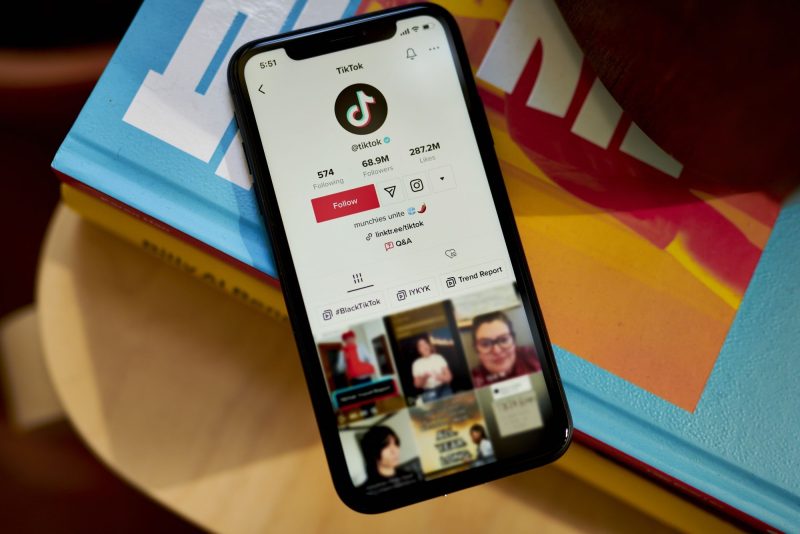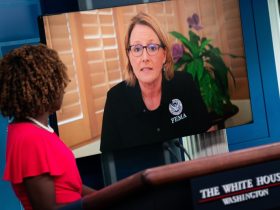Last October, President Biden spent more than an hour at the White House with eight star TikTok creators, as Democrats sought to use their reach to boost the party’s chances in the 2022 midterm elections. The White House even sent a letter to at least one of those creators, signed by Biden, expressing gratitude for their work on the platform.
Six months later, the Biden administration wants TikTok to be sold over concerns around ByteDance, the app’s China-based owners. But an uproar in Congress and a rebuke from China’s government have complicated the administration’s position, making it increasingly difficult to envision a quick resolution to the issue — or a situation in which the president again turns to its stars for political clout.
Washington lawmakers of both parties have alleged that TikTok could undermine national security by amplifying pro-Chinese propaganda and by sharing user data — such as browsing history and biometric identifiers — with China’s government. For months, some Biden aides have said privately that their preferred solution to such fears is for the site to spin off its U.S. operations, allowing TikTok to continue to operate domestically while resolving national security concerns. But China appeared to make that compromise option less likely last week, announcing it would “firmly oppose” a forced sale.
Meanwhile, momentum on Capitol Hill is growing for legislation that would give the White House the legal authority to ban TikTok outright. That could force the administration into the difficult choice between allowing the app to continue to operate — and fanning GOP attacks that Biden is “soft” on China — and banning the hugely popular social network, which could infuriate millions of its users.
“They are stuck in the middle,” said one person in touch with multiple administration officials, speaking on the condition of anonymity to reflect private conversations. “This is not the thing they care most about in terms of China. It is not their top priority, but they are caught trying to find the least-worst solution between youth backlash on the one side and China backlash on the other.”
A White House spokesman declined to comment.
A separate person familiar with internal deliberations, who also spoke on the condition of anonymity to describe private conversations, said the government could still push for a sale of TikTok’s U.S. holdings despite China’s warnings. The administration could then wait to see how the company and Beijing react to that order before considering options such as an outright ban. Such a process — which would give TikTok an opportunity to take the middle ground — could also improve the administration’s chances of prevailing in court, the person said.
Through his first two years in office, Biden has gone to great lengths to demonstrate his willingness to confront China. He has largely maintained the tariffs President Donald Trump imposed on Chinese imports, though Democrats objected when Trump announced them and Biden’s own aides worry that they exacerbate inflation. The president has also enacted aggressive new controls on technology exports to China and “blacklisted” dozens of Chinese firms to undercut Beijing. Biden’s major domestic legislative achievements — sweeping infrastructure and clean energy bills — have also been aimed at improving U.S. economic competitiveness with China by reducing U.S. reliance on Chinese imports.
And yet congressional Republicans have consistently sought to cast Biden as weak on China, searching for a wedge issue on which to demonstrate their hawkishness. TikTok has emerged as a potent target, fueled by revelations at the end of last year that some of its employees had gathered data on journalists at BuzzFeed and the Financial Times. Following last week’s contentious hearing with the company’s chief executive, Speaker Kevin McCarthy (R-Calif.) announced on Sunday night that the House would soon move to “protect Americans from the technological tentacles of the Chinese Communist Party.” Centrist Democrats have also sought to emphasize their own willingness to take on China, amplifying the calls for Biden to act.
It’s very concerning that the CEO of TikTok can’t be honest and admit what we already know to be true—China has access to TikTok user data.
The House will be moving forward with legislation to protect Americans from the technological tentacles of the Chinese Communist Party.
— Kevin McCarthy (@SpeakerMcCarthy) March 26, 2023
TikTok spokeswoman Brooke Oberwetter said in a statement after last week’s hearing that the company’s chief executive, Shou Zi Chew, “came prepared to answer questions from Congress, but, unfortunately, the day was dominated by political grandstanding that failed to acknowledge the real solutions already underway” through its proposal to settle U.S. national security concerns. The company has testified that it has not shared and would not share U.S. user data with China nor do any government’s bidding, and, at the session, Chew outlined the firm’s proposal to address U.S. security concerns by attempting to wall off the platform from foreign intrusion.
The increasing pressure poses a dilemma for Biden, exacerbated by China’s opposition to a forced sale of the app.
The White House has endorsed legislation from Sens. Mark R. Warner (D-Va.) and John Thune (R-S.D.) that would give Biden the power to ban TikTok, but would not require him to do so. Observers had long assumed that legislation would be used primarily as leverage to force China to divest its U.S. holdings, before the comments by China’s commerce ministry last week appeared to rule that out. Commerce Secretary Gina Raimondo at one point appeared to recognize the political peril, telling Bloomberg News earlier this month that “the politician in me thinks you’re gonna literally lose every voter under 35, forever” if the app is banned.
“I’m not sure anybody knows what the right answer is, and the Chinese have made it a lot more complicated because one right answer could have been to sell the company,” said William Reinsch, a former Commerce Department official who is now the Scholl Chair in International Business at the Center for Strategic and International Studies, a Washington-based think tank. “It leaves them up the creek.”
It remains possible that Congress will fail to act, leaving the status quo intact. Lawmakers are considering three separate bills, but none of them seem to have a clear path to passage.
The bill by Warner, the Senate intelligence chair, and Thune would give the Commerce Department more leeway to restrict or ban apps linked to countries deemed foreign adversaries, such as China. Warner said in a statement that the legislation “doesn’t single out any one app” and “sets up a comprehensive, orderly, risk-based, process for evaluating national security threats.” By targeting a broader category of apps, it could help any eventual ban withstand legal scrutiny.
But the proposal is facing political headwinds in the House, where some Republicans are pushing for bills that target TikTok more directly. Republicans on the House Foreign Affairs Committee earlier this month advanced a separate bill that explicitly calls out TikTok and would require the White House to report to Congress whether “reasonable grounds exist” for banning the app — and bar it if so. But Democrats on the panel denounced the move, accusing Republicans of rushing the proposal and risking U.S. national security and free expression in the process.
Another group of lawmakers is pushing a third bill that also seeks to effectively force ByteDance to spin off the app or face a U.S. ban, but it has not gained significant traction with Democrats in the Senate.
Warner and Thune’s broader approach has rankled some conservative lawmakers who have expressed concerns about executive overreach. Republicans on the House Financial Services Committee came out against the bill Thursday, calling it a “smokescreen for the largest expansion of executive power” in decades.
Proponents of the Warner-Thune proposal are pushing to build support for it in the House by arguing that it would offer a “holistic” approach to countering apps linked to foreign adversaries, creating protections for not just TikTok but also “the TikTok of the future,” according to a Senate aide familiar with the process who spoke on the condition of anonymity to discuss the negotiations.
Rep. Mike Gallagher (R-Wis.), who chairs the House select committee on China, said Sunday that the hearing with the TikTok CEO “actually increased the likelihood Congress will take some action.”
“They’ve actually united Republicans and Democrats out of a concern of allowing the CCP to control the most dominant media platform in America,” he told ABC News in an interview, referring to the Chinese Communist Party.
But Biden faces pressure from his left flank as a growing number of liberal Democrats speak out against a TikTok ban.
Speaking at a news conference alongside TikTok creators last week, Rep. Jamaal Bowman (D-N.Y.) railed against what he called the TikTok “hysteria” in Washington, which he said was rooted in “racism” and “xenophobia” toward China and could usher in a new “Red Scare.” Reps. Mark Pocan (D-Wis.) and Robert Garcia (D-Calif.) echoed the concerns, and Rep. Alexandria Ocasio-Cortez (D-N.Y.) has since also come out against a ban.
It remains unclear whether the administration would really try to push through an outright ban if that remains the only option. The White House had been trying to improve its standing on the app, with Biden sending a letter to a TikTok creator, Vitus Spehar, on Oct. 3, stating: “I am grateful for all the ways you are using your platform to educate and inspire your audience here in America and around the world. Never stop asking hard questions. Your voice is powerful.”
On Nov. 21, Biden sent another letter to Spehar expressing gratitude for “the ways you are using your platform to encourage people all over the world to get vaccinated and stay healthy this year.” “Keep up the great work,” Biden added.
A Washington Post poll also suggested young voters may disapprove of banning the app. The poll showed 40 percent of people aged 18 to 34 oppose a ban of TikTok, compared to just 28 percent in that age group who support it. Overall, however, Americans support a federal ban by 41 percent to 25 percent.
Creators, at least, know what they think. Aidan Kohn-Murphy, 19, the founder of Gen Z for Change, a nonprofit advocacy group formerly known as Gen Z for Biden, said that members of the group have met with the White House Office of Public Engagement recently on youth initiatives, but not to discuss the ban directly. During those meetings, Gen Z for Change staffers emphasized the organizing they’ve been able to successfully do on TikTok around liberal causes.
The White House has regularly tapped TikTok influencers to push the administration’s agenda on issues such as coronavirus vaccine rollout and more.
“I understand the bind the Biden administration is in,” Kohn-Murphy said. “I think what they don’t totally understand right now is the actual impact the ban would have on young people and the organizing power young people have been able to build on the app.”








